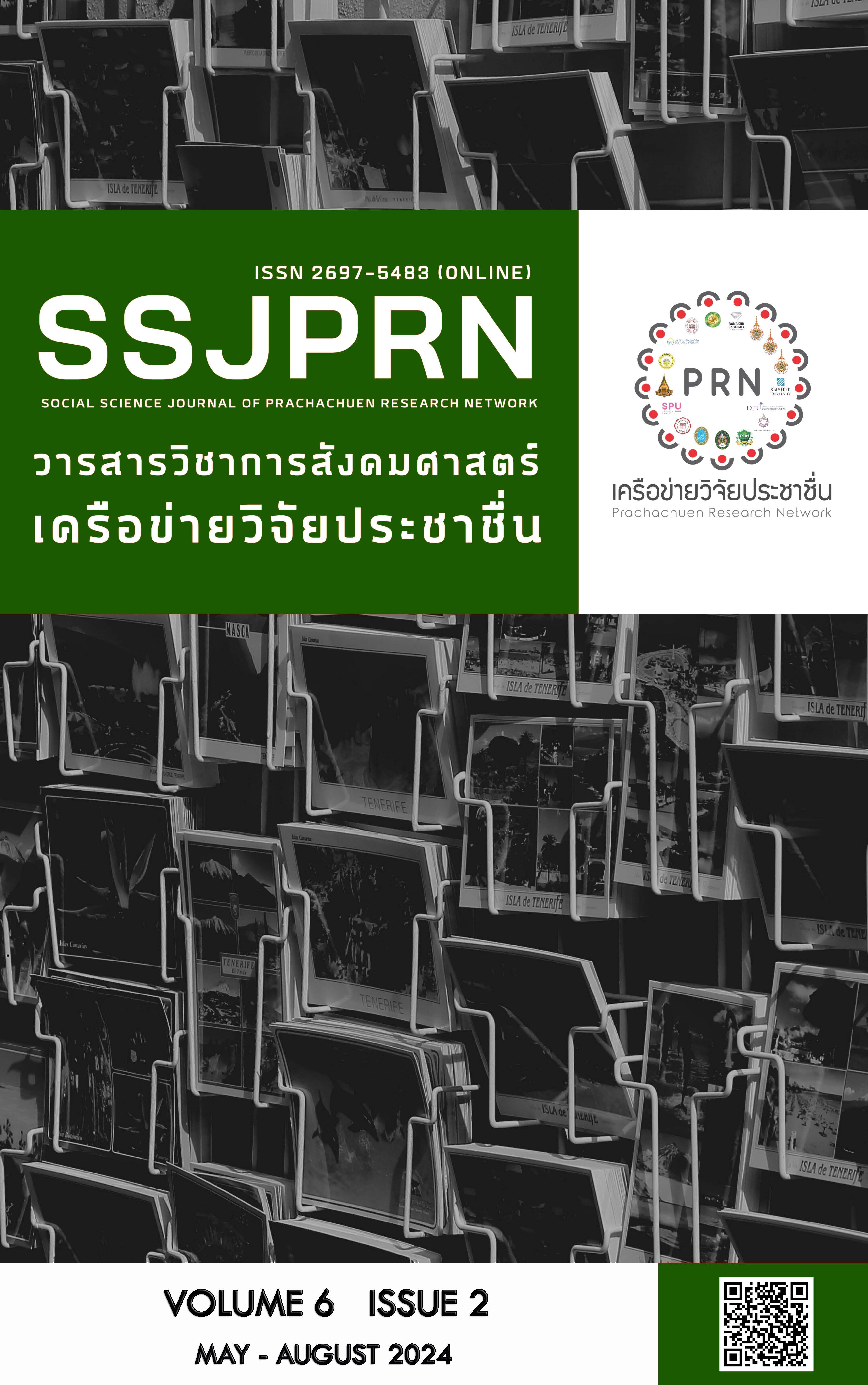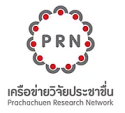THE EFFECTS OF ORGANIZATIONAL JUSTICE AND DIVERSITY MANAGEMENT ON ORGANIZATIONAL TRUST AND EMPLOYEE ENGAGEMENT OF GENERATION Z EMPLOYEES
Keywords:
Organizational Justice, Diversity Management, Organizational Trust, Employee Engagement, Generation ZAbstract
The purpose of this study was to examine the effects of organizational justice and diversity management on organizational trust and engagement among Generation Z employees. The research methodology was a quantitative research with survey method using questionnaires for data collection. The respondents were 400 Generation Z employees born between 1995 and 2012 working in organizations in Bangkok and the metropolitan area. Descriptive statistics such as frequency, percentage, mean and standard deviation were used to analyze the data. Due to hypothesis testing, Pearson’s product-moment correlation coefficient and partial least squares structural equation modeling (PLS-SEM) were used as inferential statistics.
The research results showed that organizational justice and diversity management have a positive impact on Generation Z employee engagement, while both organizational justice and diversity management have a significant impact on trust in the organization ( significance level .001). However, trust in the organization has a positive impact on Generation Z employee engagement at a significance level of .05. In addition, organizational trust acts as a mediator in the relationship between organizational justice and diversity management and has a significant impact on Generation Z employee engagement at .05 level of significance.
References
Aggarwal, A., Jaisinghani, D., & Nobi, K. (2022). Effect of organizational justice and support on organizational commitment and employee turnover intentions: the mediating role of employee engagement. International Journal of Quality and Service Sciences, 14(4), 525-554.
Alas, R., & Mousa, M. (2016). Organizational culture and workplace spirituality. International Journal of Emerging Research in Management and Technology, 5(3), 285-314.
Albrecht, S., & Travaglione, A. (2003). Trust in public-sector senior management. International Journal of Human Resource Management, 14(1), 76-92.
Alshaabani, A., & Rudnák, I. (2020). Impact of diversity management practices on organizational climate -- an Egyptian study. Management (16487974), 36(1).
Alshaabani, A., Hamza, K. A., & Rudnák, I. (2021). Impact of diversity management on employees’ engagement: The role of organizational trust and job insecurity. Sustainability 2022, 14, 420.
Alshaabani, A., Oláh, J., Popp, J., & Zaien, S. (2020). Impact of distributive justice on the trust climate among Middle Eastern employees. Polish Journal of Management Studies, 21(1), 34-47.
Anitha, J. (2014). Determinants of employee engagement and their impact on employee performance. International Journal of Productivity and Performance Management, 63(3), 308-323.
Areheart, B. A. (2019). Organizational Justice and Antidiscrimination. Minnesota Law Review, 104, 1921-1986.
Bagozzi, R. P., & Yi, Y. (1988). On the evaluation of structural equation models. Journal of the Academy of Marketing Science, 16(1), 74-94.
Bakker, A. B., & Albrecht, S. (2018). Work engagement: Current trends. Career Development International, 23(1), 4-11.
Baran, M., & Sypniewska, B. (2020). The impact of management methods on employee engagement. Sustainability, 12(1), 426.
Baron, R. M., & Kenny, D. A. (1986). The moderator-mediator variable distinction in social psychological research: Conceptual, strategic, and statistical considerations. Journal of Personality and Social Psychology, 51(6), 1173-1182.
Batmomolin, A., Sadikin, M., Hadi, J. S., & Sadana, S. (2022). Effect of diversity management on organizational trust, employee innovative behavior, and employee engagement: Evidence from Indonesia. Scientific Papers of the University of Pardubice. Series D, Faculty of Economics & Administration, 30(2), 1-11.
Bidarian, S., & Jafari, P. (2012). The relationship between organizational justice and organizational trust. Procedia-Social and Behavioral Sciences, 47, 1622-1626.
Bilginoğlu, E., Yozgat, U., & Artan, İ. E. (2019). Respect and trust in organizations: A research about their effect on job satisfaction. OPUS International Journal of Society Researches, 12, 527-543.
Biswas, S., Varma, A., & Ramaswami, A. (2013). Linking distributive and procedural justice to employee engagement through social exchange: A field study in India. The International Journal of Human Resource Management, 24(8), 1570-1587.
Bizri, R. (2018). Diversity management and OCB: The connection evidence from the Lebanese banking sector. Equality, Diversity and Inclusion: An International Journal, 37(3), 233-253.
Bravo, R., Catalan, S., & Pina, J. M. (2020). Intergenerational differences in customer engagement behaviours: An analysis of social tourism websites. International Journal of Tourism Research, 22(2), 182-191.
Chams-Anturi, O., Moreno-Luzon, M. D., & Escorcia-Caballero, J. P. (2020). Linking organizational trust and performance through ambidexterity. Personnel Review, 49(4), 956-973.
Chillakuri, B. (2020). Understanding Generation Z expectations for effective onboarding. Journal of Organizational Change Management, 33(7), 1277-1296.
Choi, S., & Rainey, H. G. (2014). Organizational fairness and diversity management in public organizations: Does fairness matter in managing diversity?. Review of Public Personnel Administration, 34(4), 307-331.
Cochran, W. G. (1953). Sampling techniques. John Wiley & Sons. Inc.
Colquitt, J. A. (2001). On the dimensionality of organizational justice: a construct validation of a measure. Journal of Applied Psychology, 86(3), 386.
Cropanzano, R., Fortin, M., & Kirk, J. F. (2016). How do we know when we are treated fairly? Justice rules and fairness judgments. Research in Organizational Behavior, 36, 139-158.
Devendhiran, S., & Wesley, J. R. (2017). Spirituality at work: enhancing levels of employee engagement. Development and Learning in Organizations: An International Journal, 31(5), 9-13.
Downey, S. N., Van der Werff, L., Thomas, K. M., & Plaut, V. C. (2015). The role of diversity practices and inclusion in promoting trust and employee engagement. Journal of Applied Social Psychology, 45(1), 35-44.
Fornell, C., & Larcker, D. F. (1981). Structural equation models with unobservable variables and measurement error: Algebra and statistics. Journal of Marketing Research, 18(3), 382-388.
Fujishiro, K., & Heaney, C. A. (2009). Justice at work, job stress, and employee health. Health Education & Behavior, 36(3), 487-504.
Ghasempour Ganji, S. F., Rahimnia, F., Ahanchian, M.R., & Syed., J. (2021). Analyzing the impact of diversity management on innovative behaviors through employee engagement and affective commitment. Iranian Journal of Management Studies, 14(3), 649-667.
Greenberg, J. (1990). Organizational justice: Yesterday, today, and tomorrow. Journal of Management, 16(2), 399-432.
Grow, J. M., & Yang, S. (2018). Generation-Z enters the advertising workplace: Expectations through a gendered lens. Journal of Advertising Education, 22(1), 7-22.
Hajiar, S. T. (2014). A statistical study to develop a reliable scale to evaluate instructors within higher institution. WSEAS Transactions on Mathematics, 13, 885-894.
Jiang, Z., Gollan, P. J., & Brooks, G. (2017). Relationships between organizational justice, organizational trust and organizational commitment: a cross-cultural study of China, South Korea and Australia. The International Journal of Human Resource Management, 28(7), 973-1004.
Kim, W., Kolb, J. A., & Kim, T. (2013). The relationship between work engagement and performance: A review of empirical literature and a proposed research agenda. Human Resource Development Review, 12(3), 248-276.
Kozlowski, S. W. J. (2023). Informational justice and transparency: Implications for organizational behavior. Organizational Behavior and Human Decision Processes, 164, 42-55.
Loi, R., Hang‐Yue, N., & Foley, S. (2006). Linking employees' justice perceptions to organizational commitment and intention to leave: The mediating role of perceived organizational support. Journal of Occupational and Organizational Psychology, 79(1), 101-120.
Macey, W. H., Schneider, B., Barbera, K. M., & Young, S. A. (2011). Employee engagement: Tools for analysis, practice, and competitive advantage. John Wiley & Sons.
Mubashar, T., Musharraf, S., Khan, S., & Butt, T. A. (2022). Impact of organizational justice on employee engagement: The mediating role of organizational trust. Cogent Psychology, 9(1), 2080325.
Nešić, A., Veljković, S. M., Meško, M., & Bertoncel, T. (2020). Correlation of trust and work engagement: A modern organizational approach. Amfiteatru Economic, 22(14), 1283-1300.
Nunnally, J. C., & Bernstein, I. H. (1994). Psychometric Theory. McGraw-Hill.
O’Connor, E. P., & Crowley-Henry, M. (2019). Exploring the relationship between exclusive talent management, perceived organizational justice and employee engagement: Bridging the literature. Journal of Business Ethics, 156, 903-917.
Oosthuizen, A., Rabie, G. H., & De Beer, L. T. (2018). Investigating cyberloafing, organisational justice, work engagement and organisational trust of South African retail and manufacturing employees. SA Journal of Human Resource Management, 16(1), 1-11.
Peterson, R. A. (2000). A meta-analysis of variance accounted for and factor loadings in exploratory factor analysis. Marketing Letters, 11, 261-275.
Rasool, S. F., Wang, M., Tang, M., Saeed, A., & Iqbal, J. (2021). How toxic workplace environment effects the employee engagement: The mediating role of organizational support and employee wellbeing. International Journal of Environmental Research and Public Health, 18(5), 2294.
Rich, B. L., Lepine, J. A., & Crawford, E. R. (2010). Job engagement: Antecedents and effects on job performance. Academy of Management Journal, 53(3), 617-635.
Saks, A. M. (2006). Antecedents and consequences of employee engagement. Journal of Managerial Psychology, 21(7), 600-619.
Saks, A. M., & Gruman, J. A. (2014). What do we really know about employee engagement?. Human Resource Development Quarterly, 25(2), 155-182.
Samuel, A. P., & Odor, H. O. (2018). Managing diversity at work: Key to organisational survival. Culture, 10(16), 40-46.
Savalei, V., & Bentler, P. M. (2005). A statistically justified pairwise ML method for incomplete nonnormal data: A comparison with direct ML and pairwise ADF. Structural Equation Modeling, 12(2), 183-214.
Sharma, A. (2016). Managing diversity and equality in the workplace. Cogent Business & Management, 3(1), 1212682.
Singh, U., & Srivastava, K. B. (2016). Organizational trust and organizational citizenship behaviour. Global Business Review, 17(3), 594-609.
Soni, D., & Mehta, P. (2020). Manifestation of Internal CSR on Employee Engagement. Indian Journal of Industrial Relations, 55(3), 441-459.
Sousa‐Lima, M., Michel, J. W., & Caetano, A. (2013). Clarifying the importance of trust in organizations as a component of effective work relationships. Journal of Applied Social Psychology, 43(2), 418-427.
Syah, T. Y. R., Ambarini, D. A., Rojuaniah, R., Hafidz, I. L. H., & Azizah, F. N. (2023). Impact of diversity management against employee engagement in B2B companies. Riwayat: Educational Journal of History and Humanities, 6(3), 806-815.
Tan, H. H., & Lim, A. K. (2009). Trust in coworkers and trust in organizations. The Journal of Psychology, 143(1), 45-66.
Tippins, M. J., & Sohi, R. (2003). IT competency and firm performance: Is organizational learning a missing link?. Strategic Management Journal, 24(8), 745-761.
Tremblay, M., Cloutier, J., Simard, G., Chênevert, D., & Vandenberghe, C. (2010). The role of HRM practices, procedural justice, organizational support and trust in organizational commitment and in-role and extra-role performance. The International Journal of Human Resource Management, 21(3), 405-433.
Ugwu, F. O., Onyishi, I. E., & Rodríguez-Sánchez, A. M. (2014). Linking organizational trust with employee engagement: The role of psychological empowerment. Personnel Review, 43(3), 377-400.
Under, I., & Gerede, E. (2024). Relationship Between Organizational Justice and Organizational Trust Perceptions and Voluntary Non-Reporting in Aviation. The International Journal of Aerospace Psychology, 1-18.
Valentine, S., & Godkin, L. (2017). Banking employees’ perceptions of corporate social responsibility, value-fit commitment, and turnover intentions: Ethics as social glue and attachment. Employee Responsibilities and Rights Journal, 29, 51-71.
Wan, H. L. (2016). Organisational justice and citizenship behaviour in Malaysia. Springer.
Wood, J. (2018). How Can We Transform Generation Z if We Don’t Know Anything About Them?. 2018 Transformative Learning Conference Proceedings. https://jotl.uco.edu/index.php/jotl/article/view/332
Yuan, K. H., & Bentler, P. M. (2000). Three likelihood-based methods for mean and covariance structure analysis with nonnormal missing data. Sociological Methodology, 30(1), 165-200.
Zanabazar, A., Jigjiddor, S., & Jambal, T. (2022). The impact of work-related stress on job satisfaction and organizational trust during COVID-19 pandemic. SHS Web of Conferences, 135, 01019.
Downloads
Published
How to Cite
Issue
Section
License
Copyright (c) 2024 Social Science Journal of Prachachuen Research Network

This work is licensed under a Creative Commons Attribution-NonCommercial-NoDerivatives 4.0 International License.
บทความที่ได้รับการตีพิมพ์เป็นลิขสิทธิ์ของวารสารวิชาการสังคมศาสตร์เครือข่ายวิจัยประชาชื่น







